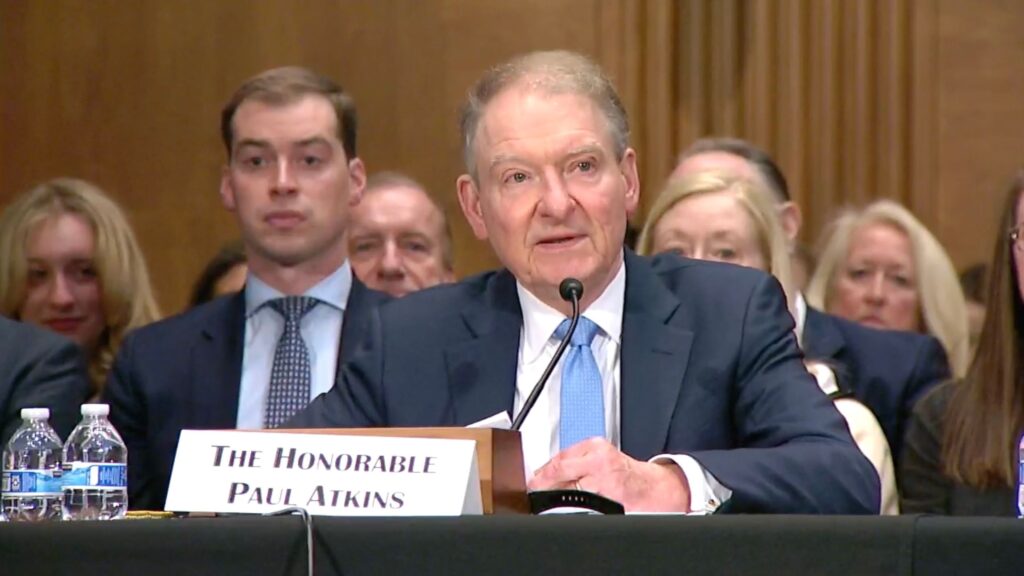Former SEC Member Promises a New Direction for Digital Assets
Paul Atkins, recently nominated by President Donald Trump to lead the U.S. Securities and Exchange Commission (SEC), has signaled a commitment to reshaping the regulatory landscape for cryptocurrencies. During his confirmation hearing on Thursday, however, he faced minimal scrutiny regarding his views on digital assets, raising questions about the urgency of regulatory reform in the crypto space.
Navigating the Confirmation Process
With Trump’s administration firmly in place, the White House is now focused on guiding key agency heads through the Senate confirmation process. Although significant discussions around crypto are emerging from both the administration and Congress, it is the leaders of regulatory agencies like the SEC who will ultimately draft the rules that govern the burgeoning industry.
Atkins vs. Gensler: A Clash of Perspectives
Atkins aims to succeed former SEC Chair Gary Gensler, who became known for his tough stance on the digital assets sector. Gensler often criticized the industry, emphasizing that existing securities laws should apply and that many entities were operating outside legal requirements. In contrast, Atkins expressed a desire to establish a “rational, coherent, and principled approach” to digital asset regulation. “A top priority of my chairmanship will be to work with my fellow commissioners and Congress to provide a firm regulatory foundation for digital assets,” he stated in his prepared testimony.
Senator Tim Scott, the committee chair, echoed Atkins’ intent, suggesting that his leadership would bring much-needed clarity to the digital asset landscape.
Skepticism from Senator Elizabeth Warren
Despite the optimism surrounding Atkins, not all senators were convinced. Senator Elizabeth Warren, the committee’s ranking Democrat, openly questioned Atkins’ impartiality, given his background as an adviser in the digital asset space. Her concerns reflect a broader skepticism about whether Atkins can effectively regulate an industry he has previously engaged with.
The Broader Context of Banking and Crypto
During the hearing, attention also turned to the role of the Office of the Comptroller of the Currency (OCC), with nominee Gould advocating for a shift in how national banks interact with the crypto sector. Scott pressed Gould on whether he would commit to reversing the OCC’s previous stance that has effectively marginalized crypto firms from traditional banking services. Gould responded affirmatively, indicating a willingness to foster better banking relationships for the industry.
Atkins’ Urgent Agenda on Cryptocurrency Oversight
While the crypto industry awaits clearer regulatory guidelines, the lack of questions directed at Atkins regarding future cryptocurrency oversight was notable. Crucial discussions on legislative efforts aimed at reforming U.S. crypto policy were conspicuously absent from the hearing.
Senator John Kennedy of Louisiana briefly diverted the conversation to former FTX CEO Sam Bankman-Fried, questioning whether the SEC had adequately investigated his parents in connection with his fraudulent activities. “I look forward to getting to the SEC to find out what happened,” Atkins replied, expressing concern over the troubling reports surrounding Bankman-Fried.
Calls for Accountability
Kennedy’s comments highlighted a growing frustration with perceived inequities in regulatory enforcement. He claimed, “I don’t think the SEC has done a damn thing,” and accused the agency of failing to hold those responsible accountable, labeling them as “crooks.”
Limited Time for Discussion
Despite the pressing issues, the hearing lasted only two hours and included four nominees, limiting opportunities for in-depth discussions. Many senators, including those expected to raise critical questions about crypto, were absent, prompting some Democrats to lament the lack of time to engage with each nominee fully.
Reflecting on Past Failures
Atkins faced challenging questions about his previous tenure at the SEC, particularly regarding the agency’s failures leading up to the 2008 financial crisis. He attributed the primary responsibility for the crisis to mortgage giants Fannie Mae and Freddie Mac, rather than the SEC’s oversight.
Next Steps in the Confirmation Process
As the confirmation process moves forward, the committee is set to vote on the nominees, which will then be forwarded for potential approval by the full Senate. The outcome could significantly influence the regulatory landscape for cryptocurrencies in the United States.



